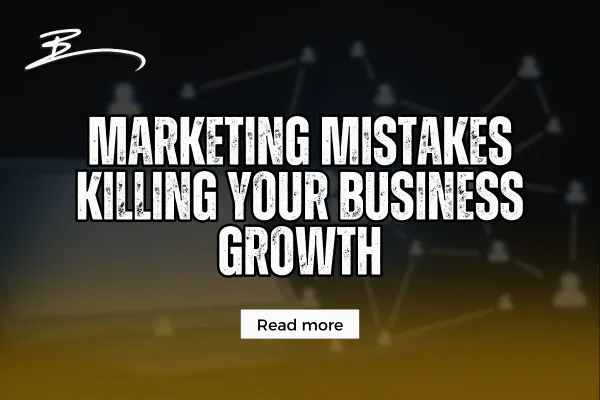Ben Lovro Blogs
AI' Client Conversion Framework

Boost Your Business Marketing with Effective Strategies

The key to success lies in implementing effective marketing strategies. With the constant evolution of digital platforms and changing consumer preferences, businesses must adapt and employ innovative approaches to stand out and thrive. Whether you're a budding startup or a well-established corporation, the right marketing tactics can significantly impact your ability to reach and engage your target audience.
This guide will delve into the essential components of successful marketing strategies that can elevate your business to new heights. From harnessing the power of social media and content marketing to utilizing data analytics and personalized messaging, we will explore proven tactics that drive tangible results.
Additionally, we will emphasize the importance of agility and adaptability in response to market shifts and emerging trends. By implementing these strategies, you can not only enhance brand visibility and customer acquisition but also cultivate long-term customer loyalty and advocacy. Join us as we uncover the tools and techniques that can propel your business forward in the dynamic world of marketing.
Identifying Your Target Audience
Conducting Market Research
Before you can effectively identify your target audience, it's crucial to conduct thorough market research. This involves gathering and analyzing data about your industry, competitors, and potential customers. By understanding the market landscape, you can pinpoint opportunities and challenges that will inform your target audience identification process.
Analyzing Consumer Behavior
Consumer behavior analysis is a key component of identifying your target audience. By examining how consumers interact with products or services similar to yours, you can gain valuable insights into their preferences, purchasing habits, and decision-making processes. This data is instrumental in crafting targeted marketing strategies that resonate with your audience.
Building Buyer Personas
One of the most effective ways to identify your target audience is by creating detailed buyer personas. These are fictional representations of your ideal customers, based on real data and market research. By outlining their demographics, behaviors, motivations, and goals, you can tailor your marketing efforts to address their specific needs and pain points.
Understanding Demographics
Quantitative data, such as age, gender, income level, and geographic location, provides a foundational understanding of your target audience's demographic makeup. This information allows you to segment and target your audience based on measurable characteristics, enabling more precise and effective marketing campaigns.
Exploring Psychographics
In addition to quantitative data, gathering qualitative and psychographic information is essential for understanding the attitudes, values, and lifestyles of your target audience. This includes their interests, hobbies, beliefs, and purchasing motivations. By delving into the psychological and emotional aspects of consumer behavior, you can create messaging and content that resonates on a deeper level.
Understanding the intricacies of your target audience is a fundamental aspect of any successful marketing strategy. By conducting comprehensive market research, analyzing consumer behavior, and developing detailed buyer personas, you can gain a nuanced understanding of who your ideal customers are and how to effectively engage with them. Armed with this knowledge, you can tailor your products, services, and messaging to meet the specific needs and preferences of your target audience, ultimately driving greater success for your business.
Developing a Comprehensive Marketing Plan
Setting Clear Objectives
When developing a comprehensive marketing plan, it is crucial to start by setting clear and achievable objectives. These objectives should be specific, measurable, attainable, relevant, and time-bound (SMART). Whether the goal is to increase brand awareness, drive website traffic, or boost sales, having well-defined objectives will provide a clear direction for the marketing efforts.
Selecting the Right Marketing Channels
After establishing the objectives, the next step is to select the right marketing channels to reach the target audience. This involves identifying the most effective platforms and mediums to convey the marketing messages. Whether it's social media, email marketing, content marketing, or paid advertising, understanding the preferences and behaviors of the target audience is essential for selecting the appropriate marketing channels.
Identify your goals and the digital marketing tools you'll need.
Once the objectives and marketing channels are identified, it's important to align the goals with the digital marketing tools required to achieve them. This may include analytics tools for tracking and measuring performance, content management systems for publishing and managing content, email marketing platforms for reaching out to the audience, and social media management tools for engaging with followers.
Evaluate your existing digital channels and assets.
Before diving into new marketing initiatives, it's essential to evaluate the existing digital channels and assets. This involves assessing the performance of current marketing efforts, analyzing the strengths and weaknesses of the existing digital channels, and identifying opportunities for improvement. By understanding the current landscape, it becomes easier to make informed decisions about the future marketing strategies.
Owned, Earned, Paid Media Framework
The owned, earned, paid media framework is a valuable concept in developing a comprehensive marketing plan. Owned media refers to the channels and assets that a brand controls, such as its website, blog, or social media profiles. Earned media encompasses the exposure and visibility gained through word-of-mouth, shares, mentions, or press coverage. Paid media involves the promotional efforts that require a financial investment, such as paid advertising on social media or search engines.
Audit and plan your owned media campaigns.
Conducting an audit of owned media involves reviewing the content, design, and functionality of the brand's owned channels. This includes assessing the website's user experience, optimizing the content for search engines, and ensuring that the brand's messaging is consistent across all owned media platforms. Based on the audit findings, a comprehensive plan can be developed to enhance the owned media campaigns and maximize their impact.
Audit and plan your earned media campaigns.
Evaluating the performance of earned media involves tracking the brand's mentions, shares, and overall visibility across various channels. By understanding the effectiveness of the earned media efforts, brands can identify opportunities to amplify positive mentions, address negative publicity, and foster relationships with influencers and advocates. A well-planned strategy for earned media campaigns can significantly enhance the brand's reputation and credibility.
Audit and plan your paid media campaigns.
In the realm of paid media, it's essential to audit the performance of the advertising campaigns to determine their return on investment (ROI) and overall effectiveness. This involves analyzing key metrics such as click-through rates, conversion rates, and cost per acquisition. By identifying the top-performing ad creatives, targeting parameters, and ad placements, brands can refine their paid media campaigns for better results.
Bring your digital marketing campaign together.
Finally, bringing the digital marketing campaign together involves integrating the owned, earned, and paid media efforts into a cohesive and synchronized strategy. This includes aligning the messaging across all channels, coordinating the timing of the campaigns, and leveraging the strengths of each media type to amplify the overall impact. By unifying the digital marketing efforts, brands can create a seamless and compelling brand experience for their audience.
Developing a comprehensive marketing plan involves a strategic approach to setting objectives, selecting the right marketing channels, leveraging digital tools, evaluating existing assets, and implementing the owned, earned, paid media framework. By following these steps and integrating the various components of the marketing plan, brands can create a powerful and effective strategy to achieve their marketing goals.
Implementing Successful Marketing Strategies
Implementing successful marketing strategies is crucial for the growth and sustainability of any organization. With the ever-evolving digital landscape, businesses need to adapt and leverage various marketing techniques to stay ahead of the curve. This section will explore a range of marketing strategies, from content marketing to influencer marketing, and provide insights into how businesses can effectively utilize these strategies to achieve their marketing goals.
Utilizing Content Marketing
Content marketing has become a cornerstone of modern marketing strategies. By creating and distributing valuable, relevant, and consistent content, businesses can attract and retain a clearly defined audience. From blog posts and infographics to videos and podcasts, content marketing allows businesses to showcase their expertise and build trust with their target audience. Leveraging content marketing can help businesses establish thought leadership, drive organic traffic, and ultimately generate leads and conversions.
Leveraging Social Media Engagement
Social media has transformed the way businesses connect with their audience. Leveraging social media engagement involves creating compelling content, engaging with followers, and utilizing social media advertising to reach a wider audience. With platforms like Facebook, Instagram, Twitter, and LinkedIn, businesses can humanize their brand, foster community engagement, and drive brand awareness. Effective social media engagement can lead to increased brand loyalty, customer retention, and even direct sales.
Harnessing Email Marketing
Email marketing remains a powerful tool for nurturing leads and converting prospects into customers. By delivering personalized and targeted content directly to a subscriber's inbox, businesses can drive engagement and conversions. From welcome emails and newsletters to promotional offers and automated drip campaigns, harnessing email marketing can help businesses build relationships with their audience and drive revenue.
Exploring Innovative Advertising Techniques
Innovative advertising techniques encompass a wide range of strategies, from native advertising and interactive ads to augmented reality and influencer partnerships. By thinking outside the box and experimenting with new advertising formats, businesses can capture the attention of their target audience and stand out in a crowded marketplace. Innovative advertising techniques can drive brand awareness, increase engagement, and drive conversions.
Video Marketing
Video has emerged as a dominant form of content consumption, making video marketing an essential strategy for businesses. From brand storytelling and product demonstrations to live streaming and interactive videos, businesses can leverage video marketing to convey their message in a compelling and memorable way. Video marketing can lead to higher engagement, improved SEO, and increased conversion rates.
Search Engine Optimization (SEO)
SEO is a fundamental component of any digital marketing strategy. By optimizing their website and content for search engines, businesses can improve their visibility and organic traffic. From keyword research and on-page optimization to link building and technical SEO, implementing effective SEO strategies can help businesses rank higher in search engine results and drive valuable organic traffic.
Implementing successful marketing strategies requires a comprehensive approach that encompasses a diverse range of techniques. By utilizing content marketing, social media engagement, email marketing, innovative advertising techniques, video marketing, SEO, and other strategies, businesses can create a cohesive and effective marketing strategy that drives results. Embracing these strategies can help businesses stay competitive, build brand equity, and achieve their marketing objectives in today's dynamic business environment.
Measuring Success and Adaptation
Key Performance Indicators (KPIs)
Key Performance Indicators (KPIs) are essential metrics that businesses use to evaluate their progress towards specific goals. These indicators vary depending on the nature of the business and the goals set.
For instance, a retail business might track KPIs such as sales growth, customer acquisition cost, and customer lifetime value, while a software company might focus on KPIs like monthly recurring revenue, customer churn rate, and user engagement. By identifying and tracking the right KPIs, businesses can gain valuable insights into their performance and make data-driven decisions to drive success.
Analyzing and Adapting Strategies
The ability to analyze and adapt strategies is crucial for long-term success. Once KPIs are established, it's important to regularly analyze the data to gain insights into what's working and what's not. This analysis can reveal trends, opportunities, and potential threats, enabling businesses to make informed decisions about their strategies. For example, if a KPI shows a declining trend in customer satisfaction, a business can adapt its customer service strategies to address the issue proactively.
Moreover, businesses must be prepared to adapt their strategies based on the insights gained from KPI analysis. This could involve making changes to marketing campaigns, product offerings, or operational processes. By being agile and responsive to changing market conditions, businesses can stay ahead of the competition and continue to drive success.
Measuring success and adaptation through KPIs and strategic analysis is fundamental for businesses aiming to thrive in today's competitive landscape. By identifying the right KPIs and leveraging data-driven insights, businesses can make informed decisions and adapt their strategies to achieve their goals. This proactive approach not only fosters continuous improvement but also positions businesses to navigate challenges and seize opportunities in an ever-evolving market.
Conclusion
Effective marketing strategies are crucial for boosting your business. By utilizing the resources and training programs available at. Ben Lovro Resources , entrepreneurs and real estate investors can gain valuable insights and tools to launch and scale their businesses.
The comprehensive training courses, ebooks, and guides offered on the webpage provide a step-by-step system for success in the business world. For entrepreneurs and real estate investors looking to take control of their future and grow their businesses, this webpage offers a unique opportunity to connect with top investors and benefit from proven frameworks.
Take the next step in advancing your business by exploring the resources available at. Ben Lovro Resources .
Contact Us

Bet On Yourself
Empowering entrepreneurs and real estate investors with the tools they need to scale.
ben@clientpro.ai
(803) 921-9915
100 Old Cherokee Road ste f 342





